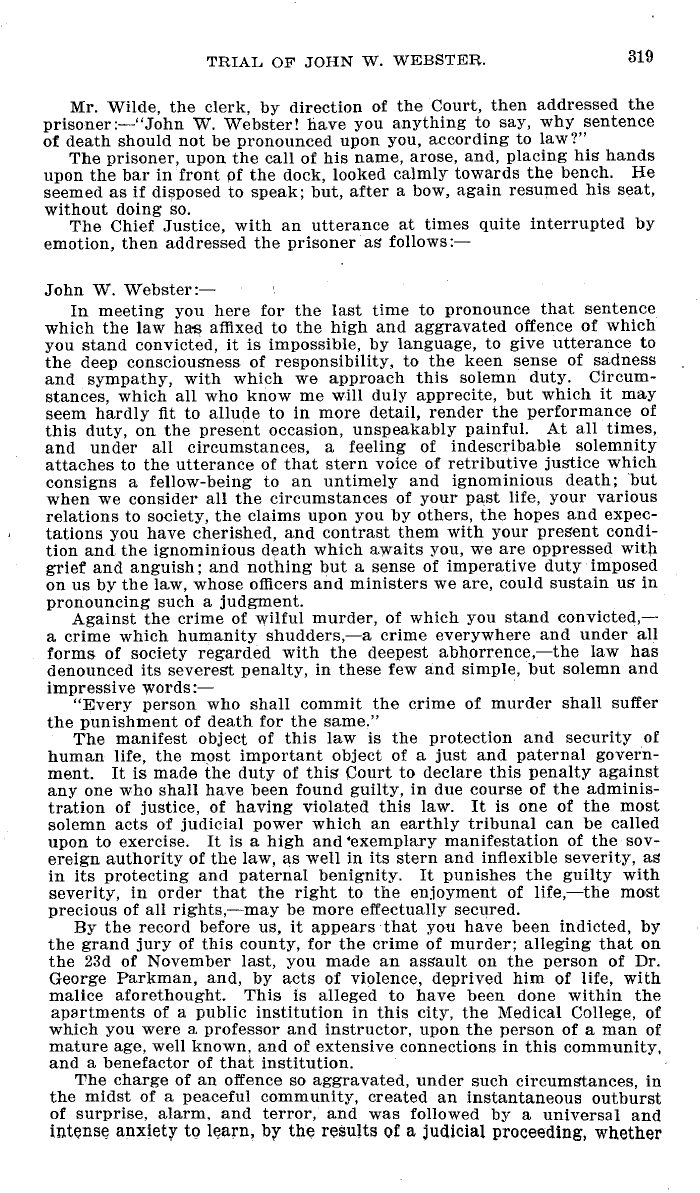|
TRIAL OF JOHN W. WEBSTER. 319
Mr. Wilde, the clerk, by direction of the Court, then addressed the
prisoner:--"John W. Webster! have you anything to say, why sentence
of death should not be pronounced upon you, according to law?"
The prisoner, upon the call of his name, arose, and, placing his hands
upon the bar in front of the dock, looked calmly towards the bench. He
seemed as if disposed to speak; but, after a bow, again resumed his seat,
without doing so.
The Chief Justice, with an utterance at times quite interrupted by
emotion, then addressed the prisoner as follows:
John W. Webster:-
In meeting you here for the last time to pronounce that sentence
which the law has affixed to the high and aggravated offence of which
you stand convicted, it is impossible, by language, to give utterance to
the deep consciousness of responsibility, to the keen sense of sadness
and sympathy, with which we approach this solemn duty. Circum-
stances, which all who know me will duly apprecite, but which it may
seem hardly fit to allude to in more detail, render the performance of
this duty, on the present occasion, unspeakably painful. At all times,
and under all circumstances, a feeling of indescribable solemnity
attaches to the utterance of that stern voice of retributive justice which
consigns a fellow-being to an untimely and ignominious death; but
when we consider all the circumstances of your past life, your various
relations to society, the claims upon you by others, the hopes and expec-
tations you have cherished, and contrast them with your present condi-
tion and the ignominious death which awaits you, we are oppressed with
grief and anguish; and nothing but a sense of imperative duty imposed
on us by the law, whose officers and ministers we are, could sustain us in
pronouncing such a judgment.
Against the crime of wilful murder, of which you stand convicted,-
a crime which humanity shudders, -a crime everywhere and under all
forms of society regarded with the deepest abhorrence,-the law has
denounced its severest penalty, in these few and simple, but solemn and
impressive words:-
"Every person who shall commit the crime of murder shall suffer
the punishment of death for the same."
The manifest object of this law is the protection and security of
human life, the most important object of a just and paternal govern-
ment. It is made the duty of this Court to declare this penalty against
any one who shall have been found guilty, in due course of the adminis-
tration of justice, of having violated this law. It is one of the most
solemn acts of judicial power which an earthly tribunal can be called
upon to exercise. It is a high and exemplary manifestation of the sov-
ereign authority of the law, as well in its stern and inflexible severity,
as
in its protecting and paternal benignity. It punishes the guilty with
severity, in order that the right to the enjoyment of life,-the moat
precious of all rights,-may be more effectually secured.
By the record before us, it appears that you have been indicted, by
the grand jury of this county, for the crime of murder; alleging that on
the 23d of November last, you made an assault on the person of Dr.
George Parkman, and, by acts of violence, deprived him of life, with
malice aforethought. This is alleged to have been done within the
apartments of a public institution in this city, the Medical College, of
which you were a, professor and instructor, upon the person of a man of
mature age, well known, and of extensive connections in this community,
and a benefactor of that institution.
The charge of an offence so aggravated, under such circumstances, in
the midst of a peaceful community, created an instantaneous outburst
of surprise, alarm, and terror, and was followed by a universal and
intense anxiety to learn, by the results of a judicial proceeding, whether
|

